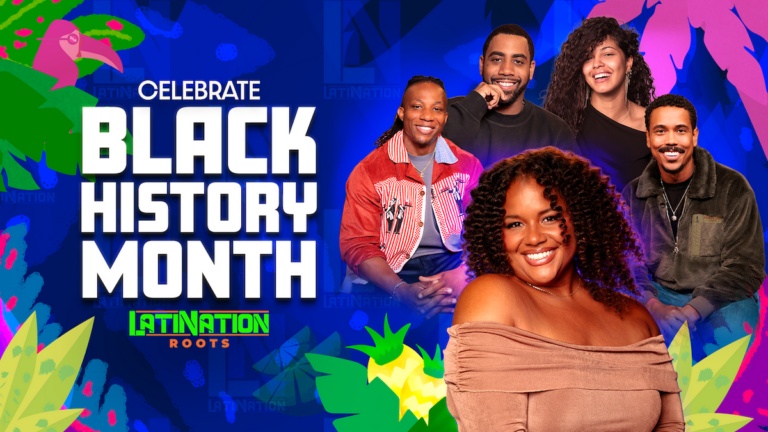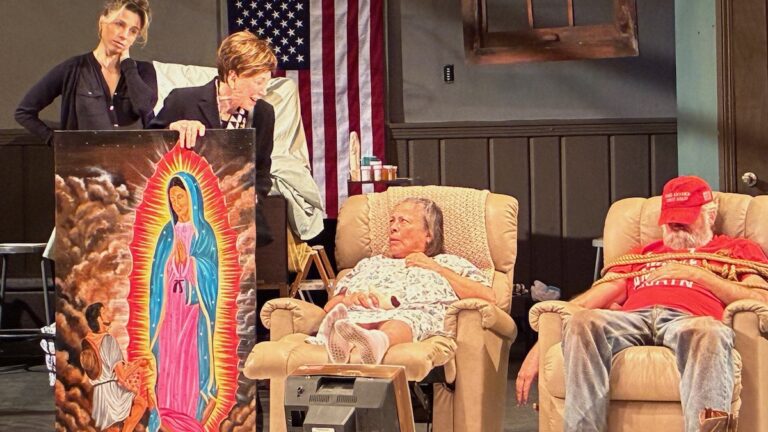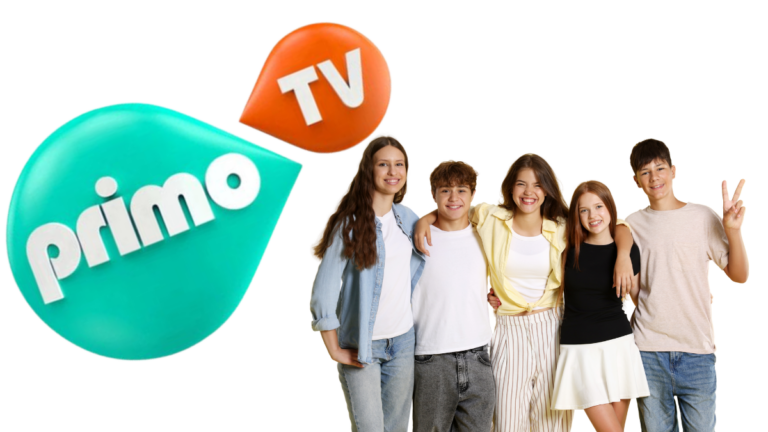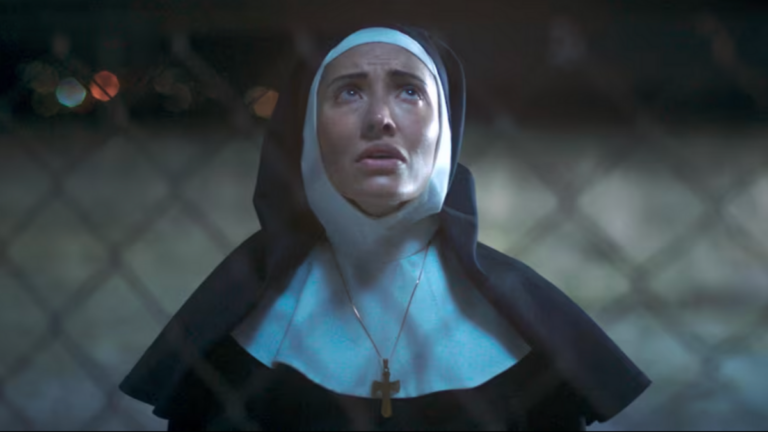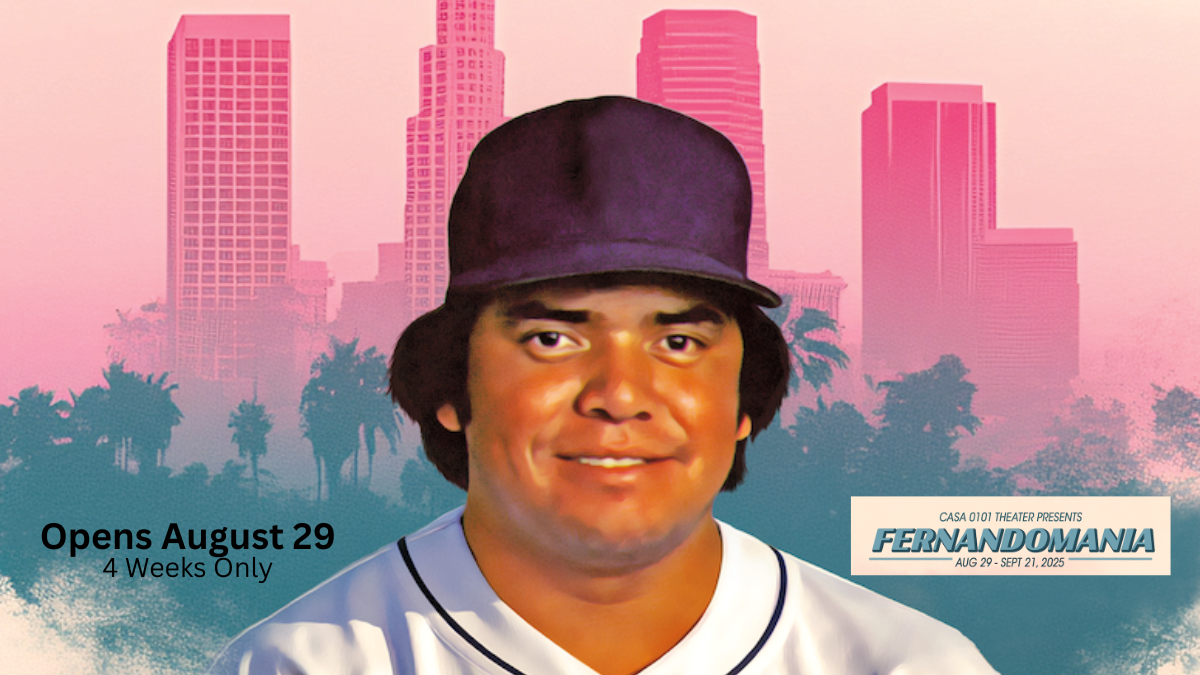
A Ten-Minute Play Festival opens at CASA 0101 Theater on August 29th
By Cris Franco
In Beisbol y Novelas (Baseball and Mexican Soap Operas), playwright Ignacio González recounts how young Jaime and his Abuela clash over their only television set whenever his Dodgers and her novela were aired at the same time. Avelino, Jaime’s dad, is caught between two generations rooted in two countries. That changes when a young Mexican pitching sensation brings the family – and the entire community – together. “I wanted to show how Fernando Valenzuela united generations through beisbol. Prior to his arrival, the sport was for little boys, their fathers or an uncle as coach. After Fernandomania, abuelas, tias and primas all wanted to watch beisbol,” said González.
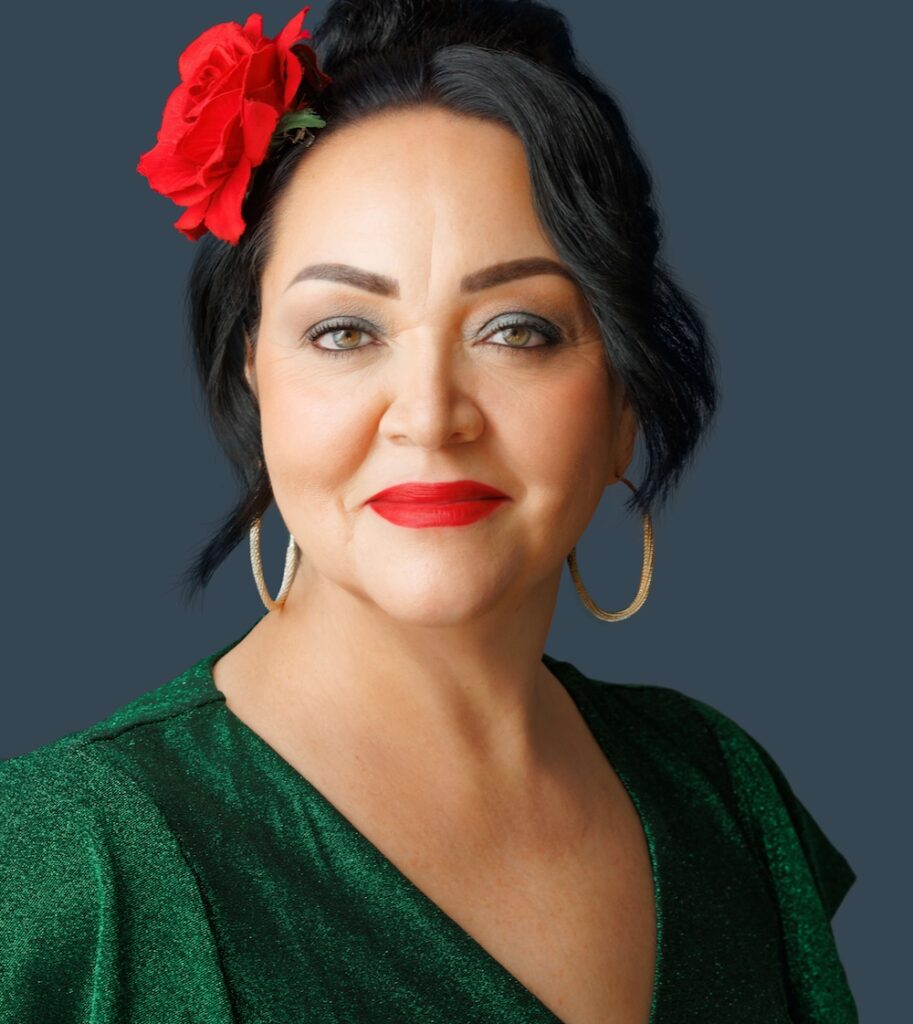
This and 11 more world premier playlets capture the uplifting, heartfelt and often life-changing effect “El Toro,” Fernando Valenzuela, had upon Angelinos during his historic pitching summer of 1990. The Sonora, Mexico-born Valenzuela’s far-reaching impact is what drove CASA 0101 Founder and Artistic Director, Josefina López, to create this anthology, saying, “When Fernando came into the general public’s consciousness, his screwball pitches not only turned him into a Major League Baseball icon — but for millions of Mexicans, like myself, he became someone to look up to. Our Ten-Minute Play Festival, FERNANDOMANIA is our way of thanking Fernando Valenzuela for the legacy he has left us.”
López’ anthology, Fernandomania Forever, is based on a poem she wrote for the Boyle Heights unveiling of renowned artist Robert Vargas’s mural of Valenzuela. “Fernando Valenzuela was my hero when I was 12-years-old, when I had none.” López continues, “My family and I were undocumented and his victories made us feel seen. My father, who was a bracero and was humiliated in this country during that time, felt so proud to be Mexican when he saw Fernando strike out his opponents. This inspired him to name my little brother after Fernando.”
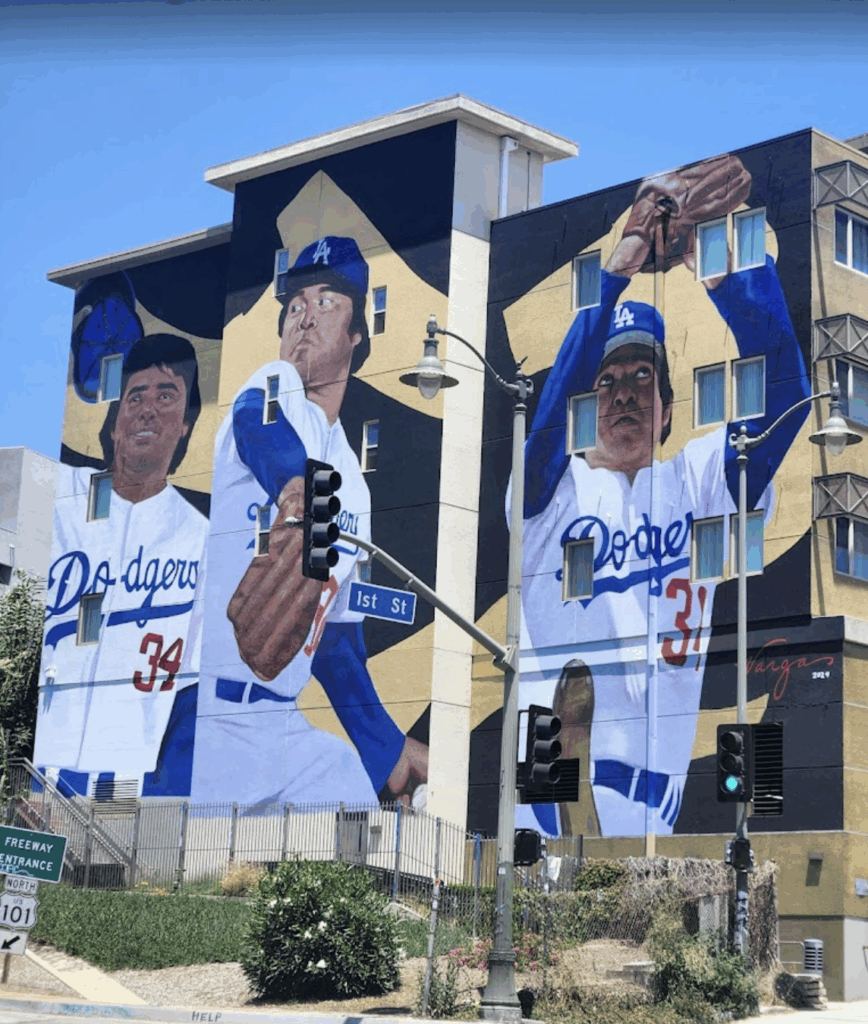
Most notable among the contributors is María Fernanda Valenzuela (Fernando’s youngest daughter) whose playlet Linda is titled after her mother who had four children with Fernando during their 42-year marriage. Says Ms. Valenzuela, “It’s been incredibly meaningful to honor my father by writing Linda, a play that reflects his impact and our family’s love. I also appreciate CASA 0101 for their continued support of young writers and actors in our community.”
And when Josefina López put out the call for the community’s recollections on Fernandomania, their response was overwhelming. Here are some selections from the night’s offerings:
In From Somewhere, by Jose Luis López, Jr., sportscaster Jaime Jarrín’s live, Spanish radio broadcasts of Valenzuela’s prowess atop the pitcher’s mound give hope to a young boy who listens intently while his immigrant parents reveal their quiet battles of work and belonging. The author says, “Though both my immigrant parents weren’t into sports, they still felt a connection to Fernando Valenzuela — because he represented people like them. I missed Fernandomania, but I grew up knowing who Fernando Valenzuela and Jaime Jarrín were before I even understood baseball. This play is about hard work, family, and being seen. It’s my way of honoring my parents and the many others who gave so much and asked for so little.”
No Sabo (I Don’t Know), written by Oscar Arguello, finds a nine-year-old boy, obsessed with television who is starting to reject his culture, until his mother points out the shared qualities between themselves and Fernando Valenzuela. He learns a lesson about identity and what truly makes a hero. Says Arguello, “This is my story. I was a non-Spanish-speaking “No Sabo Kid” in the 80s, even though my parents were Mexican. But once Fernando Valenzuela became a world-renowned television media star, I owned my identity and embraced my heritage.”
In Celina Martinez’s A Good Hero/Un Buen Heroe, a chronically ill college professor calls upon her deceased father’s spirit to re-experience the healing joy of reminiscing about their beloved “Fernando.” Martinez recalled, “As a child, I’d watch baseball with my father, Juan, who taught me all he knew about the game as he regaled me with tales of his years pitching in the Cuban baseball leagues.”
Michael St. Onge’s Once Upon A Time in LA, is based on true events. Says St. Onge, “In 1958, my grandfather immigrated to America as a young man to work the fields of Coachella. For years, he listened to the Dodgers’ games on Spanish radio, but truly became a fan when Fernando Valenzuela started pitching. Not having a lot of money growing up, going to a Dodgers game was unaffordable. After my father passed, I began manifesting behavioral problems. My grandfather invited me to see Fernando pitch. It was the first Dodgers game for us both, and it changed our lives. I think my grandfather’s pride grew as he recognized a little bit of himself in Fernando. I looked at the obstacles young Fernando had to overcome in coming to America from another country. Though he did not speak English, against all odds, he still succeeded! I realized that I also had a rough path ahead of me — but there was still a chance for me to succeed as well.”
Written by Gloria Isabel Briseño, Nando is about the playwright’s late brother, Fernando Ochoa, whom she lost a year ago in August 2024. Gloria’s narrative follows two siblings, Nando and Isabel, on their yearly hike up the Elysian Hills to talk about everything — and nothing. As the sometimes mysterious conversation unfolds, we wonder if all parties in the scene are actually present? “I was driven to write this play because of my deceased brother, me being a big Dodger fan and because I’m dedicated to never forgetting the Chavez Ravine community that was dislocated from their homes when the stadium was built. So, for me, it’s a really mixed bag. On top of that, my mother named my brother Fernando because of Valenzuela, so my play explores how one person’s brave act can impact a whole city and a single life.”
La Habra Ass Foos written by Christopher John Magallanes (aka Don Hueso) tells of Gabe who has changed his persona to fit the Chicano stereotype. Can his friends Johnny and Robert convince him to be true to himself? Their journey of self-discovery begs the burning question: What does it mean to be Chicano, anyway? Says the author of his playlet, “Fernando Valenzuela entered the public eye at a time when Mexicans felt unrepresented in Major League Baseball. Fernando’s presence in the then predominantly white sport resonated with the many Latinos who felt like they were fighting to be recognized in a country that had disregarded their value. Not only did Fernando achieve recognition and acclaim, but he did so while always being himself and never changing to appease the status quo.”
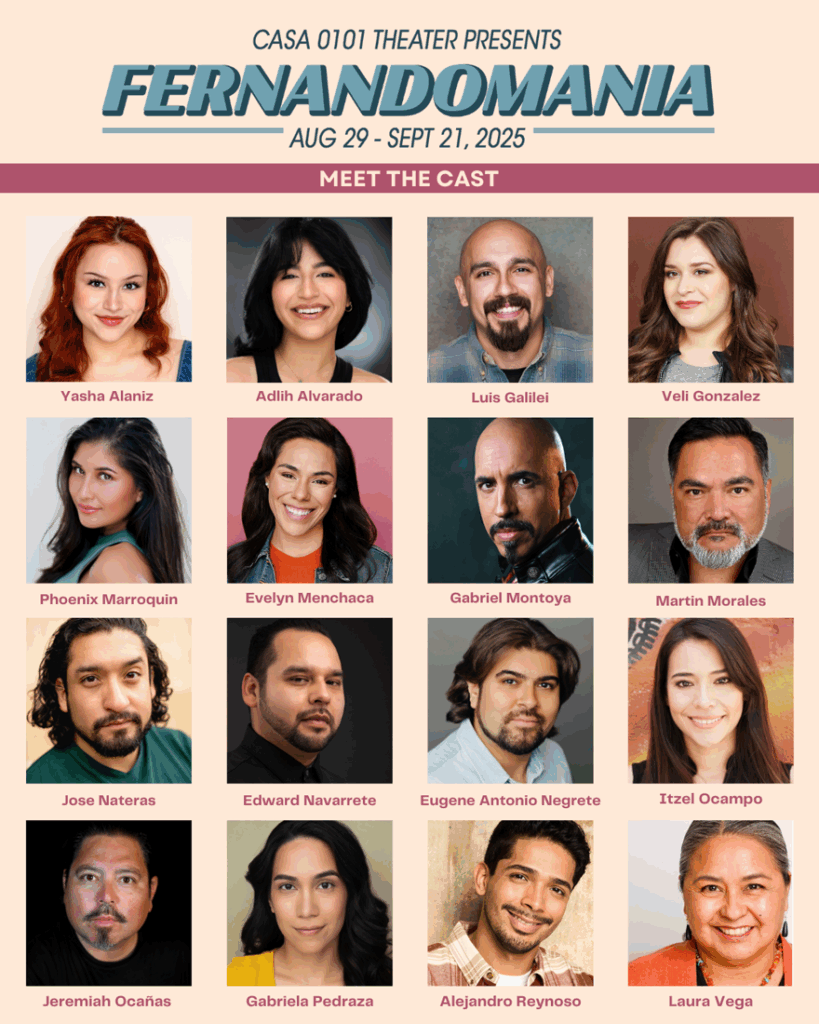
In Safe At Home, written by Kimberly Huff, a middle-aged, third generation American-Mexican Dodger fan communes with her late grandfather about Fernando Valenzuela’s influence on immigrants. She simultaneously grapples with the whiteness of her own skin and the silence of the Dodgers during the recent political events in and around Los Angeles including the recent ICE raids. Playwright Hoff said, “The main female character, Kathryn, embodies elements of my late mother and me at ten-years-old. The character of Antonio is based on my maternal grandfather, with whom I shared a strong mutual admiration of ‘El Toro.’”
Our Playground, written by Dr. Connie Valencia is semi-autobiographical. The action takes place in an East L.A. park where an amicable workout among four childhood friends takes a surprising turn when the group are all signed-up for a baseball game. To confront her anxieties and overwhelming desire to win, Cassandra allows herself to be guided by the spirit of Fernando Valenzuela.
Dr. Valencia says, “The four women represent my three friends and I, who for years all participated in YMCA youth sports at Breed Street Elementary. It was an amazing and unforgettable experience being part of that program”, She shares and continues, “My parents were more enthusiastic when Fernando Valenzuela played, because we were watching a player that represented us. On game days my parents would pick us up from school as early as possible so that we had enough time to make dinner, clean the house, finish homework and enjoy the game. My parents, especially my dad, were in high spirits and approachable when Fernando played. These were the days that I felt most at ease around my dad. The Dodgers became a cultural staple in our household when they signed Fernando Valenzuela. For the first time, many Latinos including members of my family and friends felt that Latinos were finally being acknowledged as a force in American sports.”
Chris Banda’s Blue Day, opens on four siblings sifting through what they consider to be their late father’s neglected possessions – until they unexpectedly uncover a long-buried memory that sparks a journey of healing and familial connection. Says the writer, “While cleaning out my garage, I came across some small mementos from when my son was one-year-old. He is now 26, but holding these items brought back long forgotten memories. I find it fascinating how these little keepsakes can transport us back in time, serving as magical keys that unlock doors in our minds. Many of us have strong recollections tied to experiences associated with Fernando Valenzuela, and I wanted to connect those memories to our keepsakes. These items help us preserve and transform meaningful moments into tangible memories.”
Ah, yes – memories!
FERNANDOMANIA is performed in English and/or Spanish with supertitles and is recommended for all ages – from niño to viejo! It is directed by Emmanuel Deleage, Carmelita Maldonado, Karla Ojeda and Vance Valencia with a cast featuring Adlih Alvarado, Yasha Alaniz, Luis Galilei, Veli González, Phoenix Marroquin, Evelyn Menchaca, Gabriel Montoya, Martín Morales, Jose Nateras, Edward Navarrete, Eugene Antonio Negrete, Itzel Ocampo, Jeremiah Ocañas, Gabriela Pedraza, Alejandro Reynoso and Laura Vega.
To have your own Fernandomania experience come see the show. For all info, visit: www.casa0101.org
FERNANDOMANIA
WHEN (four weeks only): August 29th thru September 21st, 2025; Fri/Sat at 8 PM & Sun at 3 PM
WHERE: CASA 0101 THEATER 2102 E. 1st St., Los Angeles (Boyle Heights), CA 90033
PRICES: General admission $25 • Seniors 60+ $22 • Boyle Heights residents & groups of 10 or more $20
TICKETS: 323-263-7684; tickets@casa0101.org ; www.casa0101.org
POST-SHOW TALK BACK SESSIONS (for ticket holders only): Sunday matinees with varying panelists, moderated by Mexican-American baseball author: Professor Richard Santillan
